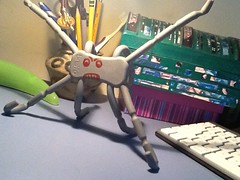Clarion West Write-a-thon report: I have finished the 20,000 words I committed two six-ish weeks ago! Bow down in awe, or, better yet, sponsor me!!
I have finished my first complete start-to-finish story written on the iPad, 8,500 words of urban fantasy, drafted on paper and entered into a simple text app called Simplenote and then, when it was far enough along to need formatting, in Doc2 HD. The latter let me back it up to Dropbox, so it wasn’t just resident in the pad’s memory (and therefore vulnerable) for very long… it hits the cloud and my laptop very briskly.
How well will this work when I’m revising an 85K word novel? We’ll have to see. In fact, we’ll see starting this very morning! I had thought I couldn’t search the text in a long document, which was just about a dealbreaker. I need to be able to hop back and forth to specific points in the story… however, I’ve just figured out that Doc2 does do this.
Other things about the tech side of this…
–iPad, keyboard and cases being three pounds lighter than the laptop, my upper body is much happier about hauling it around.
–The tablet has spoiled me, somewhat, for typing on the iPod with my thumbs. So my hands are happier too, especially as I have been trying to give them a break by texting less. (Sorry, Tweeps.) However, there’s a two hour window on Thursdays when I used to get a ton of blogging, teaching, and article-writing done on the pod, and now I’m pretty disinclined. I will need to find another way, as those two hours on the bus are a necessary work window, and the ride goes faster when I’m busy. (Probably this will end up being me writing longhand and dictating the text into Dragon later.)
–The fact that the pod fits in one hand still makes it nicer for a certain amount of casual web surfing and reading. I have smallish hands, and the pod is a good size and weight for them.
–I have two stands for the iPad. One is the origami keyboard case that essentially transforms the thing into a teeny tiny laptop. The other is a six-legged Gumby type spider thing, which Rumble considers his mortal enemy. We mostly use Gumby for watching Netflix in bed. So we’ll get set up and start watching an episode of, say, Leverage, and a few seconds later the screen will start sliding away from us, as Rumble attempts to drag Gumby off to his lair for punishment.
–I am still waiting for someone to recommend the two dollar app that will make me rich, famous, taller, interested in fashion, obscenely athletic, capable of flying a helicopter and spiritually enlightened. Bueller? Neo? Anyone?









